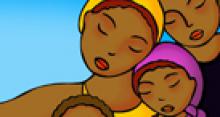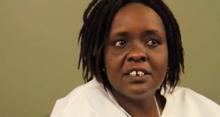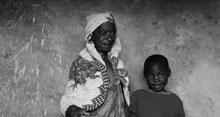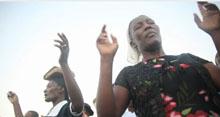Additional Stories
Butterfly Dreams
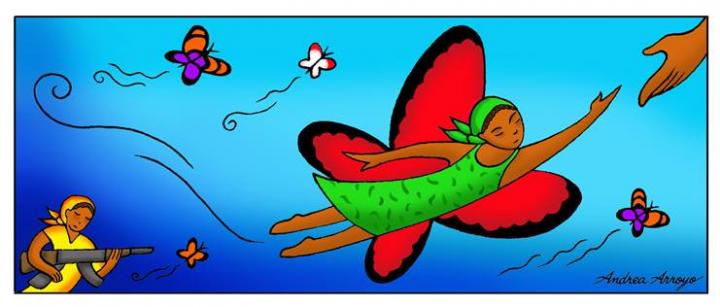
Labalpiny read out your name on Mega FM. This was an answer to our daily prayer. We have listened to the programme every day for five years. You and ten other children had been rescued by the soldiers from the rebels in Sudan. For a minute we thought we heard it wrong. We waited as Labalpiny re-read the names. He mentioned Ma’s name. Our village, Alokolum. There could not be any other Lamunu but you.
During the past five years, we had become part of the string of parents who listened to Mega FM. Listening and waiting for the names of their loved ones. We sat close to the radio every day. Our hearts thumped every time we heard Lamunu or Alokolum. We listened without saying words for one hour; each day we sighed after the programme. When the days turned into years, we prayed more often. Your name seemed to have disappeared, and our chance of seeing you faded. We waited. We bought Eveready batteries to keep the radio going.
Lamunu, we may never tell you this: We buried your tipu, spirit, when word went around that you would not come back to us. The neighbours had begun to tell us that you would never return. Bongomin, who returned after four years of abduction, said he saw your dead body bursting in the burning sun. We never believed you were dead. We also didn’t want your tipu to roam northern Uganda. We didn’t want you to come back and haunt us. Ma never believed for one moment that you were gone. It was her strength that kept us hoping that one day you would return. She said she dreamt that butterflies were telling her to keep strong. The night after the dream there were so many butterflies in the house. We thought she was running mad. We thought you had taken her mind with you.
Ma wore opobo leaves for three days to let your tipu rest. We knew that she did it to make us happy. We advised her to let you rest so that she could move on with her life. She never did. She walked around as if her tipu had been buried along with yours. Your tipu was buried next to Pa. We didn’t want you to loiter in the wilderness in the cold. Ma said you deserved to rest. To rest peacefully in the other world. Then, we heard your name on the radio. And we didn’t know what to do. Run away? Unveil your tipu? Let you go on without knowing what we had done? We may never find the courage to let you know this. Maybe one day you will see the grave with your name on it, and then the butterflies will give us the right words and strength to tell you.
You were at World Vision, a rehabilitation centre for formerly abducted children. You were being counselled there. You were being taught how to live with us again. Ma cried and laughed at the same time. Yes, you were alive. We couldn’t believe at long last our anxiety would come to rest. That night, Ma prayed. We prayed till cockcrow. We were happy. We were happy you were alive. Pa might have turned in his grave. We were happy to know you were alive.
* * *
You returned home. You were skinny as a cassava stem. Bullet scars on your left arm and right leg. Your feet were cracked and swollen as if you had walked the entire planet. Long scars mapped your once-beautiful face. Your eyes had turned the colour of pilipili pepper. You caressed your scars as if to tell us what you went through. We did not ask questions. We have heard the stories before from Anena, Aya, Bongomin, Nyeko, Ayat, Lalam, Auma, Ocheng, Otim, Olam, Uma, Ateng, Akwero, Laker, Odong, Lanyero, Ladu, Timi, Kati. We are sure your story is not any different.
When you returned home, Lamunu, we were afraid. We were afraid of you. Afraid of what you had become. Ma borrowed a neighbour’s layibi. Uncle Ocen bought an egg from the market. You needed to be cleansed. The egg would wash away whatever you did in the bush. Whatever the rebels made you do. We know that you were abducted. You didn’t join them and you would never be part of them. You quickly jumped the layibi. You stepped on the egg, splashing its egg yolk. You were clean. You didn’t ask questions. You did what was asked of you. It’s like you knew that you had to do this. Like you knew you would never be clean until you were cleansed. Ma ululated. You were welcomed home. Back home where you belonged.
We watched you silently. In return, you watched us in silence. We gave you food when we thought you were hungry. You gulped down the sweet potatoes and malakwang without saying a word. We didn’t want to treat you as if you were a stranger, but in our hearts we knew that you were new. We knew that you would never be the same again. We didn’t know what to expect of you. We waited to hear you say a word. We wanted to hear your husky voice. Hear you do the loud laugh you did before the rebels snatched you from us. We wanted to tickle you and watch your body move with laughing. But you were silent. You watched us with awe. You had grown now. Your breasts were showing through the blue flowered dress that you wore.
We greeted you. We thanked God when we saw you. You didn’t answer our greetings. You looked at us. We saw your eyes glistening. We knew you were happy to be back. We knew you were happy to see us alive.
That night Ma cried in her bed. She whispered your name time and again as if wishing you would at least say Ma. Although she was happy you were back, she never said it. She expected you to say something. Something that would make her believe your spirit was in that body you carried around. We wanted to know whether your tipu had been buried with your voice. We had never been taught how to unbury a tipu. We only hoped that your real tipu was not six feet under.
We wanted to see you alive again. Although you were fifteen then, we wanted to know if you were still interested in becoming a doctor. We wanted to see you smile again. We wanted to see your eyes brighten as your mother gave you water and did the dance that you liked when you were a child. We wanted something that would make us know that you recognised us. We wanted to do our best to make you happy.
Ma never spoke of the butterflies again. We never heard of the butterfly dreams any more. We wanted the butterflies to come and say something to Ma.
* * *
We watched you as you studied our new home. Our new home had become something new. We watched the neighbours watch you with disgust. They were not happy you were back. Some of them still clutched the radio waiting for Labalpiny to read their son’s name. They waited to hear him call out their names, like lupok cam call out our names to give us yellow posho and beans.
Lamunu, we no longer till our land. Our children no longer know how to hold a hoe. They have forgotten how the groundnut plant looks. Now, our land buries our children. Our gardens grow huts. We now live in a camp. Lupok cam call it internally displaced people’s camps. From the sky our camp looks like a farm of mushrooms. We have empty huts with empty people whose tipu have been buried or have taken a walk.
Look at the huts, Lamunu. This is something that we don’t expect you to understand. Something you couldn’t recognize. This is something that we don’t understand. This is our home, something that we don’t know how to explain to you. Something we took refuge in. This is our home that keeps us alive. Keeps us sane. Just huts. Grass and bricks. Just huts to hide our nakedness. When Latim and his neighbours built their huts here, they said Alokolum was safe. Their children will not be abducted. Their wives will not be raped. They will have something to eat. Then so-and-so built in our gardens all with the same hopes and dreams. Then everybody wanted to build their huts in our land. We couldn’t dig anymore. We had no more food. We later learnt our home had been marked in the map of Uganda as a camp.
Don’t look at us like that, Lamunu. Yes, we now eat yellow posho. Yes, yellow posho that Ma used to feed Biko, Pa’s hunting dog, before the war. We wait for lupok cam to provide us with cooking oil and beans, and of course, yellow posho. That’s all we eat now. Sometimes we don’t have enough. Sometimes lupok cam don’t even come at all. We scramble to get out of the camp to look for something to stop the gnawing feelings in our stomachs. Just a little something. Some wild plants. Some malakwang kulu. Some things that our ancestors never ate. Then we found out there were soldiers guarding us. They don’t want us to get out of the camp. Why? we asked. They said they don’t want rebels to abduct more of us. These days, my dear, they abduct anybody. Anybody whom they can force to stand and be shot in the battlefield.
We asked the soldiers, Where were you when Lamunu was abducted? Where were you when the rebels came and took our young ones? Where did you go to when the rebels came and raped our women as we watched? They told us they had not been paid. Sod off! we told them. Let us go to look for food. Then they came with their sticks to beat us as if we were school children.
* * *
You spoke in your dreams. You turned and tossed in your mud bed. We held your hands. You were like a woman in labour. You spoke of ghosts. You spoke of rebels chasing you in Adilang because you tried to escape. You spoke of Akello, your friend, whom they made you and your team beat to death because she tried to escape. You said you didn’t want to kill her. You said you remembered the commandment ‘thou shall not kill.’ You said you didn’t want to participate. You didn’t want to hurt anybody. You said you saw Akello covered with sticks. You saw the blood in her mouth. You watched as the older rebels checked to confirm that she was dead. You were nauseated. You tried to vomit but there was nothing to let out. The last meal, raw cassava and boiled chicken, which you had looted from a camp, had already been digested.
We listened to you. We wanted to feel your pain. We wanted to know what you knew. We squeezed your hand. We wanted you to let out what you had been holding onto. You let us squeeze your hand. You didn’t wince when blood flowed. We never could drain all your pain away.
* * *
Today, we watched you get drenched in the rain. You stood there still as the rainfall poured on you. You were not disturbed by the loud thunderstorm. We made space for you in the hut. Waited for you with warm clothes. We thought you were letting out something. We didn’t interrupt you.
As the rain became a drizzle, you entered the hut. You bypassed Ma with the warm clothes in her hands. You sat with your wet clothes on. We noticed that it was the time of the month for you. You let the rain wash the blood away. You let us watch the blood streak down your leg. You didn’t see the tears rolling down your mother’s face.
Later that day, we listened to you curse under your breath. We watched you tremble when you heard the government fighting planes flying over Katikati. We knew that you were worried about the people you left behind. We knew that you knew what would go on when the planes went after the rebels. We didn’t ask you for stories. We have heard the stories from Anena, Aya, Bongomin, Nyeko, Ayat, Lalam, Auma, Ocheng, Otim, Olam, Uma, Ateng, Akwero, Laker, Odong, Lanyero, Ladu, Timi, Kati.
* * *
Lamunu, we remember as if it were yesterday when the rebels came to our home. That night was the night we knew that there would be many more nights like that one. We heard the butts of the guns hitting people’s heads. We heard the screams. We heard the rebels demanding our children from our own homes. We were helpless.
You were still dazed with sleep. One rebel not much older than you grabbed you by the hands. You were wearing only a T-shirt. Ma grabbed a skirt for you to wear. You went out of the house with it still in your hand.
Ma’s pleas and cries were answered only with the butts of guns on her head. She asked them to take her instead. But the rebels demanded medicine. They wanted the medicine she brought from the government hospital in town. Lamunu, Ma would never have let you go. You were only eleven. Reading for your Primary Leaving Exams. You always wanted to be a doctor. You said you wanted to do what Ma was doing, not as a nurse, but as a doctor.
We later learnt that they went house to house in Katikati as well, taking all boys and girls around your age with them. They said that the rebels would train the children to fight. Train them to lure other children. Join the big war to save the Acholi. Oust the government. Overthrow Museveni’s government. We didn’t know what that meant. We didn’t want to ask anyone. What we knew was that we didn’t want our children to get involved in that war.
* * *
We watched as you always prepared to go to school like it was a special ritual. Brushing your teeth and then taking a bath. You carefully splashed the water from the galaya onto your slender body. You didn’t eat the breakfast that Ma made for you. You packed it in your school bag so that you wouldn’t be late for school. We admired you for that. Even when the war started and many children were waylaid, you managed to get there. You cursed the teachers and called them cowards when you didn’t find any children or teachers. Days after a heavy fight between the rebels and soldiers you continued to go to school. You never gave up even when you didn’t find anybody there.
You said that the war affected the education of the children only in the north. The rest of the children in Uganda studied. And the exams were all the same. You went to school when everyone was hiding in the bush. Ma begged you not to go. Children were waylaid by rebels on their way to school, she pleaded. You always managed to get to school. Found an empty class. Disappointed, you would come home. Ma later became your teacher. Ma taught you about reproduction even if she knew she shouldn’t say such words to her daughter. You were eager to learn. Pa wanted to teach you too, even though he didn’t know how to read and write.
* * *
Lamunu, we don’t know how to tell you that Pa is no longer with us. You may have noticed that he is not around. We don’t know with which mouth to tell you that he was cut to pieces by those you were fighting for. He was found in a garden he rented in Lalogi. He said he could not depend on lupok cam to provide him and his family with food. You know your father. He was a proud man. He believed that a strong man should show his strength by the amount of food he had in his granary. Before the war, there was a lot of food in the granary. The neighbours were jealous of that. He dug like a tractor. His cows were the best in Alokolum. Everybody wanted to buy milk from him. Even the lazy Lutukamoi, he tried to dig night and day but couldn’t get done half of what your father could achieve.
The rebels found him digging and asked him what he was doing since everybody was supposed to be in a camp. He said a man has to provide for his family. They mocked him and told him to join them to fight if he was strong man. He said he would not join them because he did not start the war they were fighting. Ten young men beat him up with whatever they could find. They later cut his body into pieces. Lamunu, we did not eat meat after we buried your father and we have not eaten meat since then … We could never understand why another human being could humiliate another, even in their death.
Each day we pray that we get the strength to tell you. And one day when the war ends, you will tell us your story. And we will tell you our stories.
* * *
We learnt from the neighbours that you went to school. You asked the headmaster to register you as a primary six pupil. We didn’t know that you could talk. We were happy that you said something, even though it wasn’t to us. The headmaster looked at your skinny body. You told him you wanted to become a doctor. He asked you whether you could pay. You didn’t answer that. You knew that we didn’t even have a coin to put food on the table. You said you didn’t care and that all you wanted to do was to study. You said you could pay when you were finished with your education.
You entered a primary four class. The pupils watched you silently. They thought you were a mad girl. They muffled their screams, worried that you would hit them or something. They knew that the war had brought something that they didn’t understand. They wanted to survive, so whatever didn’t kill them they would watch to try to find a way.
Ma ran to school when she heard that you were there and argued with the headmaster. She wondered why you didn’t tell her anything. She wanted to help you. She wanted you to talk to her but she didn’t want to push you as well. She loved you though she could not say it.
* * *
Ma spoke to the headmaster of Lacor Primary School. The headmaster agreed to let Ma pay your school fees in installments. She says that she is happy that you still want to go to school.
You said apwoyo. You said thank-you to Ma. That’s the first word we have heard you say. We’re happy to hear you say something. We hope that you will be able to say a lot more. Tell us more than Anena, Aya, Bongomin, Nyeko, Ayat, Lalam, Auma, Ocheng, Otim, Olam, Uma, Ateng, Akwero, Laker, Odong, Lanyero, Ladu, Timi … Most of all, we want to hear your voice.
* * *
You look very beautiful in your new uniform. The headmaster of Lacor Primary School for formerly abducted children has donated the uniform to you. Ma says that you will get special treatment. Most of the children are like you. They too have killed, tortured other children. They too fought in a war that they didn’t understand. The teachers will treat you well, Ma says. They have had special training.
You are very happy. We can see you have woken up early. You have packed your bag with your new books. You have written your name neatly written on the books.
We know that your dreams will come true. You will be a doctor some day. Do the work that Ma does but wearing a white coat.
There are tears in Ma’s eyes. You look the other way. We know that you know they are tears of happiness.
First published in Butterfly Dreams and Other New Short Stories from Uganda, edited by Emma Dawson (CCC Press, 2011), and reproduced by permission.
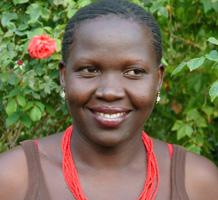
Beatrice Lamwaka was short-listed for the Caine Prize in African writing in 2011 and was a finalist for the PEN/Studzinski Literary Award of 2009. She serves on the board of Uganda Women’s Writers Association (FEMRITE) and is a freelance journalist with Monitor Newspaper and the Global Press Institute. She is currently studying for a master's degree in human rights at Makerere University. She was a laureate for the Council for the Development of Social Science (CODESRIA) Democratic Governance Institute in 2010. She is a fellow for the Harry Frank Guggenheim Foundation’s Young Scholars program 2011. She has worked in Uganda, Italy, and Sudan. She writes poetry and short stories, and is working on her first novel and a collection of short stories.
Illustration by Andrea Arroyo
Related Content
|
Valerie Mason-John tells the affecting story of a woman in Sierra Leone who lost many of her children and watched her country be torn apart by war and the search for blood diamonds. |
Esther, once part of the Maasai tribe in Kenya, shares how one woman empowered her to become an activist and better mother. |
Sasja van Vechgel, alongside the Foxes NGO, photographed mothers, children, and families affected by the HIV/AIDS endemic in Tanzania. |
This visual poem celebrates the strength that many Haitian mothers have displayed in the wake of the devastating 2010 earthquake. |
